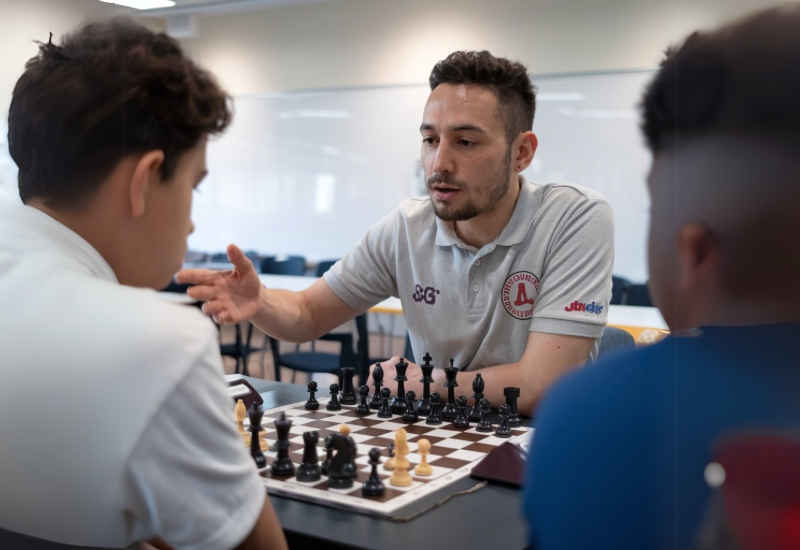Best Lessons from an Online Chess Coach for Game Improvement
A great chess coach is like a compass in the intricate chessboard jungle, providing guidance, sharpening skills, and paving the way to competitive success. Beyond tactics, coaches impart foundational principles and effective strategies, helping players gain a deeper grasp of the game.
Curious about the best lessons a chess coach can offer? This guide dives into top insights from seasoned coaches, from opening strategies to mastering complex endgames.
Introduction to Chess Coaching
Chess coaching offers players a structured path toward growth. Coaches don’t just teach tactics; they build strategic thinking, enhance patience, and foster a winning mindset that applies on and off the board.
- Role and Importance of an Online Chess Coach
An online chess coach’s role extends beyond explaining moves. Coaches evaluate a player’s strengths and weaknesses, design training routines, and provide insights that lead to steady improvement. Good coaching combines theoretical knowledge with practical game experience, bridging the gap between beginner mistakes and advanced play.
- Characteristics of Effective Chess Coaching
Effective coaching goes beyond the basics. A strong coach is patient, encouraging, and adaptable, helping students understand complex concepts in ways that resonate with their unique learning styles. By setting achievable goals, a great coach keeps players motivated, focused, and constantly improving.
Ready to experience personalized chess growth? Caissa, the AI-powered online chess coach by CircleChess, offers a structured learning platform designed to assess your chess knowledge, track monthly progress, and provide tailored insights. With Caissa, you’ll receive guidance that adapts to your strengths and areas for improvement, helping you develop the strategic thinking and resilience essential for success.
Foundational Lessons
Every successful chess player builds upon a set of foundational principles. These lessons focus on understanding the essentials of chess, from opening strategies to the endgame.
- Understanding Chess Principles
Chess principles guide every move. Coaches emphasize the importance of controlling the center, developing pieces efficiently, and focusing on king safety. These core ideas form the foundation of solid play, helping players avoid common pitfalls.
- The Importance of Opening Strategies
A well-planned opening sets the stage for the game. Coaches often teach players a few reliable openings for both white and black, covering moves like the Italian Game and the Sicilian Defense. Learning a balanced opening repertoire provides consistency and confidence, reducing the chances of getting caught off guard early in the game.
- Developing Middlegame Tactics
The middlegame is where tactics come alive. Coaches encourage players to learn tactics like pins, forks, skewers, and discovered attacks. These concepts can turn a neutral position into a winning one. Practice puzzles and tactical exercises are common tools coaches use to reinforce these ideas.
- Importance of Endgame Mastery
Coaches know that many games are won or lost in the endgame, where resources are scarce, and precision is key. Lessons in pawn endgames, opposition, and rook endgames prepare players to handle high-pressure situations. Mastering the endgame allows players to convert slight advantages and salvage draws from difficult positions.
Strategic Thinking Development

Strategic thinking is at the heart of chess. Developing a strategy involves more than just tactical maneuvers; it requires understanding the broader game plan and anticipating the opponent’s moves.
- Recognizing Patterns and Common Positions
Experienced coaches train players to recognize recurring patterns, like piece formations, pawn structures, and typical attacks. Recognizing these patterns speeds up decision-making and allows players to approach positions with confidence, knowing what works and what doesn’t.
- Learning to Anticipate Opponent Moves
Anticipating the opponent’s moves is a fundamental skill. Coaches teach students how to consider their opponent’s threats and plans, which helps them make proactive, rather than reactive, moves. By thinking a few moves ahead, players can stay one step ahead of their opponents.
- Balancing Aggression and Defense
A well-rounded player knows when to attack and when to defend. Coaches help players find this balance by studying positions that require patience and restraint. Learning to weigh risks and rewards enables players to remain calm under pressure and make decisions that align with their overall strategy.
Enhancing Analytical Skills
Chess is a game of analysis, and improving analytical skills allows players to see deeper into positions and understand the implications of each move.
- Conducting Post-Game Analysis
After each game, coaches encourage players to review their moves, identify mistakes, and understand alternative options. Post-game analysis helps players learn from each experience, building a record of what worked and what didn’t. Tools like Chess.com’s Game Review or Lichess analysis tools are excellent for this purpose.
- Learning from Mistakes
Mistakes are part of the learning process, and coaches know this well. A good coach encourages players to view mistakes as opportunities for growth. Identifying recurring errors allows players to focus on specific areas of improvement, gradually strengthening their overall game.
- Use of Chess Software and Tools
Modern chess coaching often incorporates digital tools. Platforms like Caissa enable players to analyze their games in-depth, identify patterns, and spot improvement areas. With the insights offered by these coaching platforms, you can refine your strategies, track performance, and build a stronger, data-driven approach to your chess journey.
Mental and Emotional Preparedness
Success in chess isn’t just about skill; it’s also about mental resilience. Online chess coaches help players develop the focus and emotional discipline needed to stay calm and play at their best.
- Building Concentration and Patience
Concentration and patience are vital in chess, where a single lapse can result in a blunder. Coaches use timed exercises and visualization techniques to help players build mental stamina, ensuring they remain focused even in long games.
- Developing Emotional Resilience
Chess can be emotionally demanding, especially when facing difficult positions or tough opponents. Coaches teach players how to handle setbacks gracefully and stay motivated, fostering resilience that translates into better performance.
- Handling Victory and Defeat Gracefully
Winning and losing are both part of the game. Coaches instill sportsmanship by encouraging players to appreciate both victories and losses as learning experiences. Respecting opponents and reflecting on each game with an open mind fosters a healthy competitive spirit.
Advanced Techniques and Tips
Once players have a solid foundation, coaches introduce advanced techniques to further refine their skills.
- Advanced Opening Repertoire Building
Advanced players often specialize in specific openings that suit their style. Coaches work with students to develop a deep opening repertoire, including variations and traps that can give them an advantage against prepared opponents.
- Complex Middlegame Strategies
In advanced play, the middlegame becomes highly tactical. Coaches introduce concepts like pawn breaks, piece coordination, and creating imbalances that allow players to gain an edge. By practicing complex strategies, players develop the intuition to navigate challenging middlegame positions.
- Proficiency in Endgame Nuances
Advanced endgame techniques, such as the Lucena and Philidor positions, are essential for converting advantages. Coaches emphasize the importance of practice, as these techniques require precision and patience. A well-prepared player in the endgame can outmaneuver opponents and clinch victories in drawn positions.
Optimizing Practice and Growth

Chess improvement requires structured practice and commitment. Coaches provide guidance on effective practice routines and ways to measure progress.
- Effective Practice Methods
Coaches design tailored practice schedules that balance tactics, strategy, and theory. Effective practice includes solving puzzles, reviewing games, and working on weak areas. Consistency is key, and a good coach keeps players engaged with varied exercises.
- Participating in Tournaments
Playing in tournaments is one of the best ways to gain experience and test progress. Coaches encourage players to participate in tournaments, whether local events or online competitions. Tournament play provides real-world experience that sharpens focus and builds confidence.
- Setting and Achieving Chess Goals
Setting realistic goals gives players a clear path to improvement. Coaches help players set both short-term and long-term goals, such as reaching a specific rating or mastering a new opening. Tracking achievements keeps players motivated and encourages continuous growth.
Wrapping Up: Integrating Lessons into Gameplay
Chess coaching is more than learning moves; it’s about building a comprehensive understanding of the game. Each lesson, from foundational principles to advanced strategies, contributes to a player’s development and confidence.
By combining lessons on openings, middlegame tactics, endgames, and mental resilience, players gain a holistic approach to chess. Revisiting these concepts regularly solidifies their impact and improves gameplay.
Chess is a game of infinite possibilities, so continual learning is essential. Embracing a mindset of adaptation and curiosity allows players to grow with each game. The best online chess coaches impart this attitude, encouraging players to stay open to new strategies and challenges.
Ready to elevate your chess skills? The Caissa School of Chess offers a comprehensive coaching experience with a curriculum designed to help you master every aspect of the game. Join LIVE classes led by world-class GM coaches who have mentored chess prodigies like Gukesh, Arjun, Raunak, and Nihal. Engage in peer-to-peer learning with students of similar skill levels, participate in regular assignments and practice tournaments, and access supplementary classes to ensure steady improvement. Embrace a structured path to mastery with Caissa School of Chess and unlock your full potential on the board.





